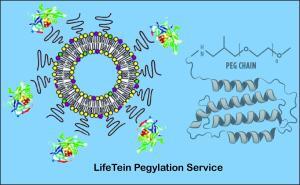Polypeptides are used as new drug candidates to target specific disease symptoms. However, peptide drugs are rapidly degraded by proteolytic enzymes and neutralized by antibodies. Pegylation of polypeptide drugs improves their pharmacodynamic and pharmacokinetic profiles. Pegylating specifically can minimize the loss of biological activity and reduce immunogenicity. LifeTein offers peptide pegylation service and the PEG-modification of peptides through primary amines and sulfhydryl groups.
A significant limitation of the present PEGylated peptides is their heterogeneous nature because PEG is conjugated at many different nucleophilic amine residues. LifeTein’s approach to peptide PEGylation can address the fundamental issues of site-specific conjugation and high-efficiency conjugation. The click chemistry is widely used in the pegylation process.
The efficient ratio of 1:1 PEGylation of a peptide can be completed in 24 hours and purification of the PEG-protein conjugate in another three hours, without destroying their tertiary structure or abolishing their biological activity.
LifeTein’s improved technology is the use of branched structures, in contrast to the linear structures. Branched PEGs have increased molecular masses of up to 60 kDa or more, which is good at cloaking the attached polypeptide drug from the immune system and proteolytic enzymes.
Pegylation is the established method for improving the pharmacokinetics and pharmacodynamics of peptide pharmaceuticals.
New frontiers for the technology are now emerging for PEG-based hydrogels and PEG-modified liposomes, small-molecule modification, and the primary targets for pegylation of small-molecule drugs, oligonucleotides, lipids, cofactors, antibodies, saccharides, and nanoparticles.

Pegylation service from LifeTein